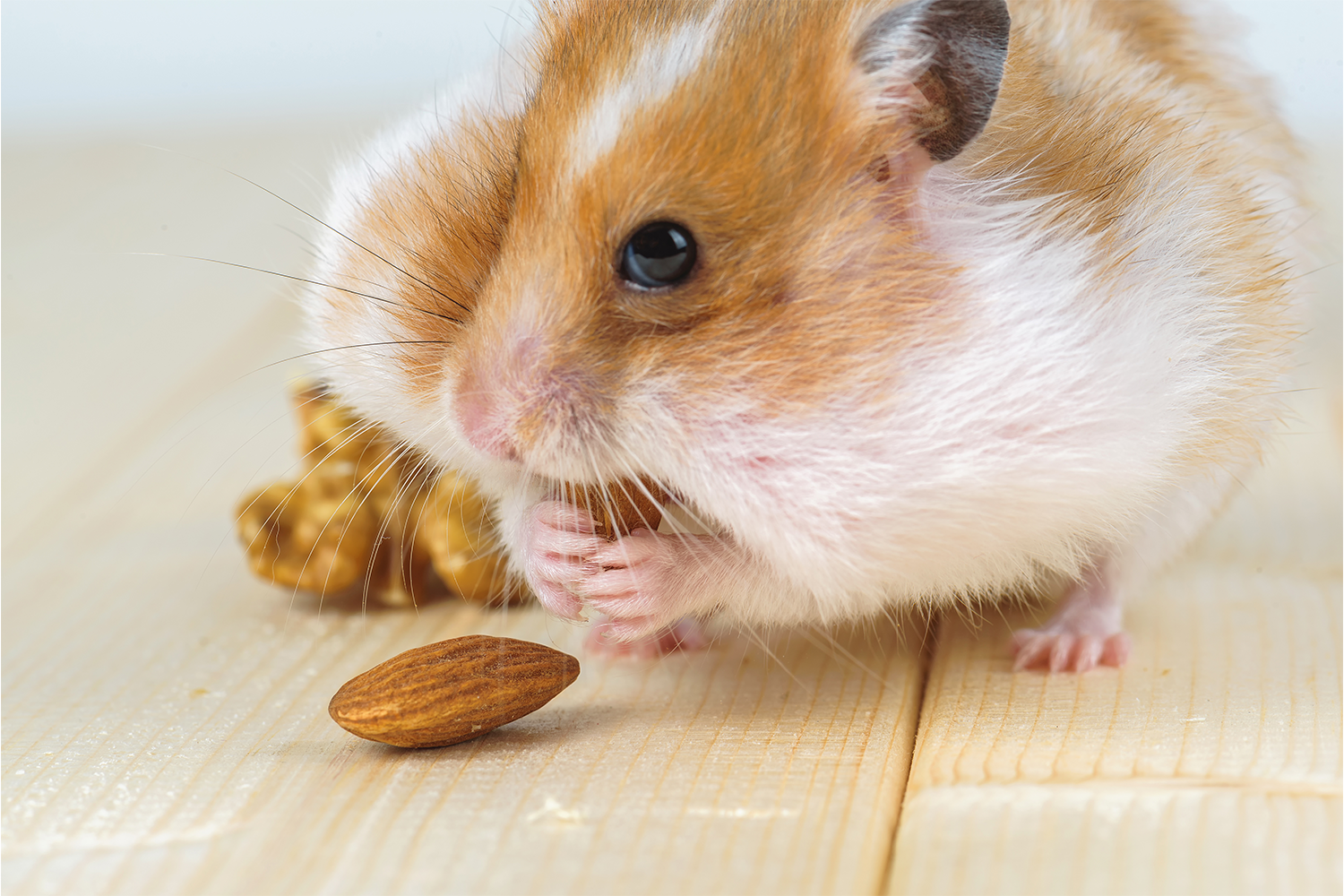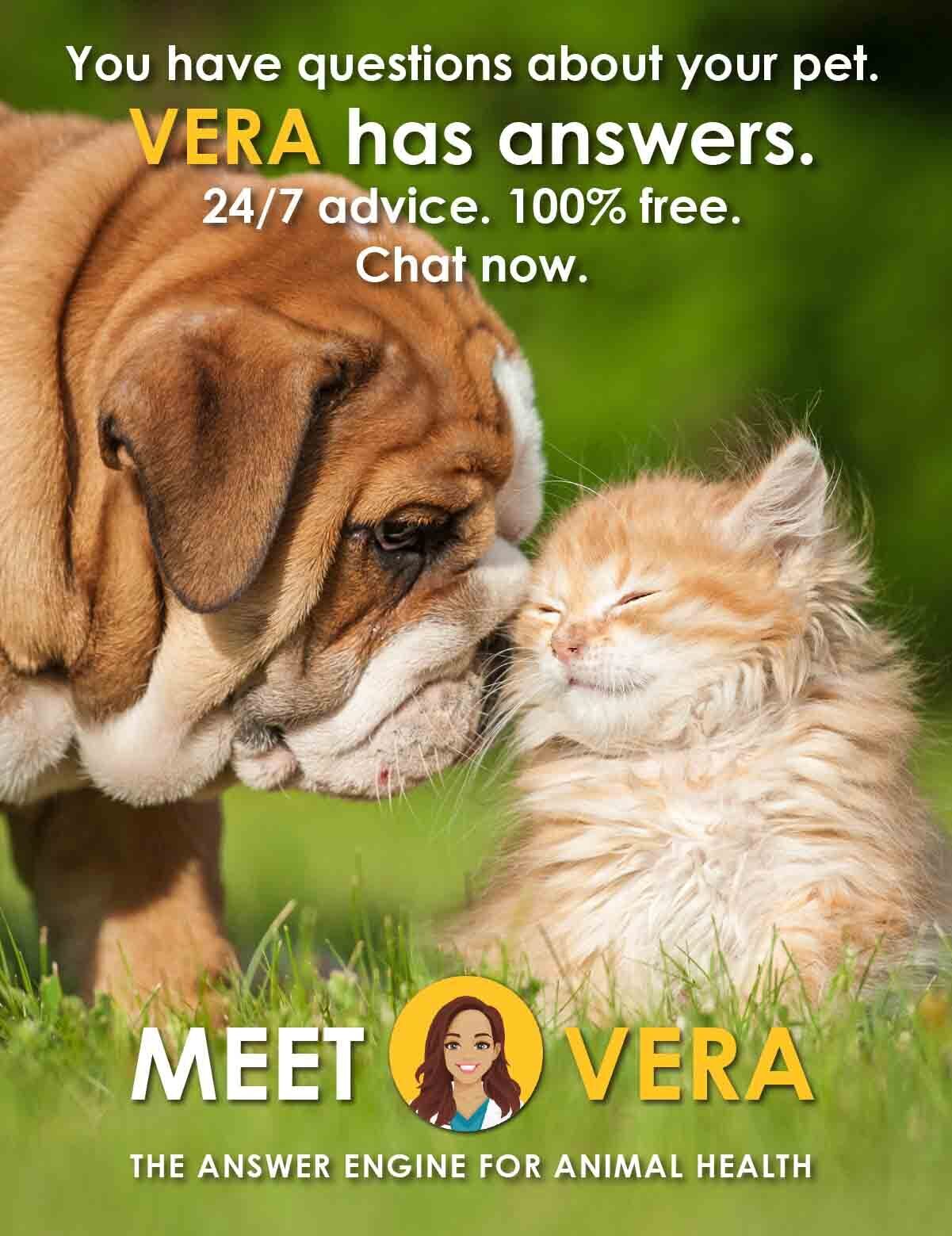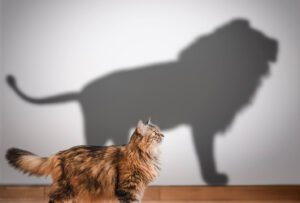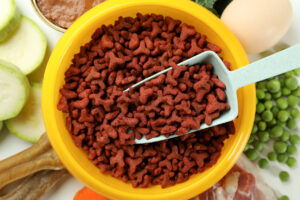There are many types of hamsters that you can find at your local rescue or pet shop — Syrian hamsters and dwarf hamsters are just a few common varieties. While all hamsters may be different, their diets tend to look pretty similar across the board.
If you are considering adopting a hamster, preparing to feed them the right food and treats is vital to keep them healthy and happy. Hamsters aren’t able to go out and forage the way they would out in the wild, so they rely on us for everything they need.
Keep reading to learn more about what your hamster should and should not eat.
A Hamster’s Diet
Hamster food is heavily related to the small animal’s native environment, which is very dry. They enjoy eating from a food bowl filled with seeds and even small bugs like crickets and mealworms for protein.
Many assume that hamster pellets and a few sunflower seeds are sufficient for a hamster’s diet, but they really prefer a wide range of different options, including some human food. Your furry friend’s diet should also include fresh fruits like watermelon and vegetables like sweet potatoes, but in moderation and under a watchful eye.
A hamster is unlikely to overeat, so having plenty of food will allow them to eat whenever needed. Opting for fresh can also improve the quality of a hamster’s diet. Changing their bowl out every day would keep their food as fresh as possible. This will also assist in keeping your hamster’s teeth healthy.
Hamster Feeding 101
A pelleted diet is often best for hamsters, but it can get dull. If the dry food in their dish never changes, your hamster might turn up their nose and refuse to eat.
Veggies like romaine lettuce and fruits like blueberries are great to include, as well as ensuring they get protein, fiber, and fatty acids in their daily diet.
Vegetables and Fruit
While vegetables and fruit are suitable for most hamsters, it’s advised not to give them too much of anything as it might oversaturate their diet. Fruits and veggies are high in fiber, which is essential to a hamster’s diet.
Apples, pears, and carrots are good fruits and veggies to include in a pet hamster’s diet. They will provide plenty of fiber and vitamins to your hamster daily. Your hamster would enjoy carefully-sourced and prepared dandelions, timothy hay, or clovers to munch on as an occasional treat. These small pets really enjoy dark leafy greens.
Hay provides fiber as well, so be sure to pick up a bag of it before taking your hamster home.
Protein
Some people assume hamsters are herbivores when, in fact, they are technically omnivores.
Hamsters need protein so that they can properly grow and repair their tissues and stay healthy for a longer amount of time. Hamsters are known to eat small insects that are relatively easy to catch when in an enclosure. You can also feed your hamster some dry dog food every now and then to give them a boost of protein.
Again, it’s not advised to do this too frequently, but every few days, the additional protein is much appreciated.
Fatty Acids
For your hamster to maintain healthy skin and fur, they need to be eating enough foods with fatty acids. An easy and enjoyable way for your hamster to get enough fatty acids in their diet is to snack on some seeds and nuts.
You can often get everything you need in a premixed bag from the pet store, but be careful — some of these are too high in sugar and lack essential nutrients.
Fresh Water
Hamsters need access to fresh water at all times. Using a drip bottle is the easiest way for your hamster to access water whenever they need it. They generally catch on quickly about how to use it. Make sure you are checking it daily to see if it needs to be refilled, but get into a habit of changing it every morning.
What Can’t Hamsters Eat?
It’s unlikely that you’re going to be trying to share all of your snacks with your hamster, but there are some foods you should steer clear of. Some foods can be particularly toxic to hamsters and similar pets like guinea pigs and chinchillas.
If you aren’t sure whether or not your hamster can have a food item, it’s best to play it safe and not feed it to them at all.
Chocolate
Chocolate and sweets are dangerous. While this is pretty much the case with all pets, you have to consider how small your hamster is compared to a dog or even a cat.
One small piece of chocolate can have a more detrimental effect on your hamster. Hamster pet parents should keep all of their chocolate away from their pets for safety.
Processed Foods
In general, any processed foods you might snack on yourself will not be suitable for your hamster. A lot of these foods are very high in sugar and low in fiber — two things that aren’t ideal for your hamster’s health.
There are snacks and treats that you can purchase for your hamster that are specifically made for them to enjoy. These options will provide you with a safe alternative and will definitely boost your fluffy friend’s mood.
Too Much Fruit
Though fruit and veggies are recommended, too much fruit can overload your hamster with too much sugar. Fruits are packed with “healthy” sugars, but this is still too much for your hamster’s small body. Feeding them a moderate amount of fruit and veggies and keeping an eye on them while they snack will ensure you know how much they are actually consuming.
Quick List of Foods To Avoid
Here is a list of some foods (not all) that are not good for your hamster’s health:
- Acorns
- Buttercup
- Bindweed
- Citrus fruits
- Elder
- Garlic
- Onions
- Unripe or overripe fresh foods
- Muesli-style mixes
- Dairy products
- Jam
- Rhubarb
- Grapes
Big Questions About Small Pets
Hamsters might be small, but you have a lot of big questions about them. You might wonder why they are biting or how to make their home as enriching as possible — or a thousand other questions.
We get it. That’s why when you join AskVet, you can sign up for a virtual session with a Certified Pet Lifestyle Coach (CPLC) to ask all the behavioral questions you might have. They can help create a full 360° Lifestyle Plan to attend to every need your hamster might have.
Additionally, with an AskVet account, you can chat on the mobile app with a licensed veterinarian to help put together the optimal diet for your hamster (or any other pet). That’s right — This app is not just for cats and dogs. The AskVet team is knowledgeable about a variety of different animals and is willing to help anyone get to the bottom of an issue.
Sources:
Nutrient Requirements of the Hamster | NCBI
Hamster Diet | Elmbrook Humane Society






